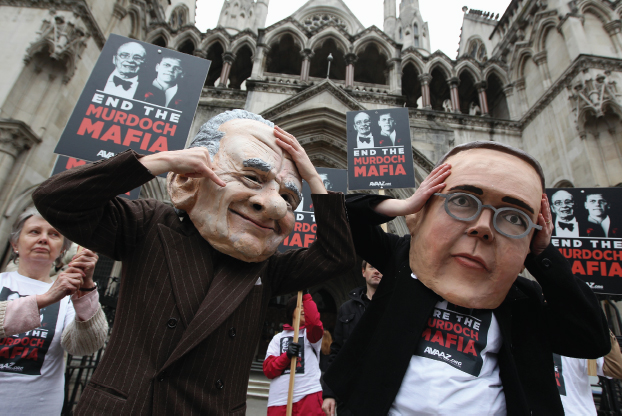The Limits of Antitrust Laws
Although meant to ensure multiple voices and owners, American antitrust laws have been easily subverted since the 1980s as companies expanded by diversifying holdings, merging product lines with other big media firms, and forming local monopolies, especially in newspapers and cable. The resulting consolidation of media owners has limited the number of independent voices in the market and reduced the number of owners who might be able to innovate and challenge established economic powers.

Diversification
Most media companies diversify among different media products (such as television stations and film studios), never fully dominating a particular media industry. Time Warner, for example, spreads its holdings among its television programming, film, publishing, cable channels, and Internet divisions. However, the media giant really competes with only a few other big companies like Disney, Viacom, and News Corp.
Such diversification promotes oligopolies in which a few behemoth companies control most media production and distribution. This kind of economic arrangement makes it difficult for products offered outside an oligopoly to compete in the marketplace. For instance, in broadcast TV, the few networks that control prime time—all of them now owned by or in league with film studios—offer programs that are selected from known production companies that the networks either contract with regularly or own outright. Thus, even with a very good program or series idea, an independent production company—especially one that operates outside Los Angeles or New York—has a very difficult time entering the national TV market. The film giants even prefer buying from each other before dealing with independents. So, for example, in 2009 CBS sold syndication rights for its popular crime show The Mentalist to the TNT cable channel for over $2 million per episode. And for years, CBS’s Without a Trace and NBC’s Law and Order were both running in syndication on cable’s TNT channel, owned by Time Warner, which also co-owns the CW network with CBS.
Local Monopolies
VideoCentral  Mass Communication
Mass Communication
bedfordstmartins.com/mediaculture

The Impact of Media Ownership
Media critics and professionals debate the pros and cons of media conglomerates.
Discussion: This video argues that it is the drive for bottom-line profits that leads to conglomerates. What solution(s) might you suggest to make the media system work better?
Because antitrust laws aim to curb national monopolies, most media monopolies today operate locally. For instance, although Gannett owns ninety daily newspapers, it controls less than 10 percent of daily U.S. newspaper circulation. Nonetheless, almost all Gannett papers are monopolies—that is, they are the only papers in their respective towns. Virtually every cable company has been granted monopoly status in its local community; these firms alone often decide which channels are made available and what rates are charged.
Furthermore, antitrust laws have no teeth globally. Although international copyright laws offer some protection to musicians and writers, no international antitrust rules exist to prohibit transnational companies from buying up as many media companies as they can afford. Still, as legal scholar Harry First points out, antitrust concerns are “alive and well and living in Europe.”25 For example, when Sony and Bertelsmann’s BMG unit joined their music businesses, only the European Union (EU) raised questions about the merger on behalf of the independent labels and musicians worried about the oligopoly structure of the music business. The EU has frequently reviewed the merger, starting in 2004, but decided in late 2008 to withdraw its opposition.
Occasionally, independent voices raise issues that aid the Justice Department and the FTC in their antitrust cases. For example, when EchoStar (now the DISH Network) proposed to purchase DirecTV in 2001, a number of rural, consumer, and Latino organizations spoke out against the merger for several reasons. Latino organizations opposed the merger because in many U.S. markets, Direct Broadcast Satellite (DBS) service offers the only available Spanish-language television programming. The merger would have left the United States with just one major DBS company and created a virtual monopoly for EchoStar, which had fewer Spanish-language offerings than DirecTV. In 2002, the FCC declined to approve the merger, saying it would not serve the public interest, convenience, and necessity.
In 2011, AT&T moved to acquire T-Mobile, another wireless telecom giant (with more than thirty-three million customers), for $39 billion. The Justice Department opposed the merger on antitrust grounds (media watchdog groups said it would have left the country with just three major mobile phone companies, giving consumers far fewer options), leading AT&T to eventually scrap the deal.